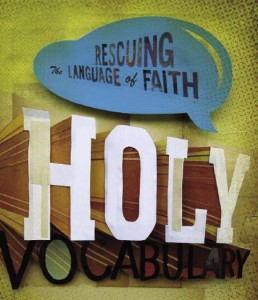 A couple months ago, I wrote a post about the need for Christians to maintain a distinct vocabulary in keeping with our distinctive nature as the people of God. Shortly thereafter, I began a summer series with my small group in which we explored ten important words in the Christian’s vocabulary. Assisting me in my teaching is an excellent resource from Michael Kelley.
A couple months ago, I wrote a post about the need for Christians to maintain a distinct vocabulary in keeping with our distinctive nature as the people of God. Shortly thereafter, I began a summer series with my small group in which we explored ten important words in the Christian’s vocabulary. Assisting me in my teaching is an excellent resource from Michael Kelley.
Michael’s newest Bible study for LifeWay’s Threads Bible study curriculum is called Holy Vocabulary: Rescuing the Language of Faith. The concept behind this series is that Christians must reclaim our particular vocabulary. We overuse some words to the point that we empty them of meaning (“love”, “saved”, etc.). Other words suffer from lack of appropriate attention (“propitiation”, “sanctify”, etc.). Michael’s study serves to introduce (or reintroduce) these important words – not so we can check off the boxes on a vocab quiz, but so that we are drawn into a deeper relationship with Christ.
Holy Vocabulary is a seven-week small group study. Each week includes five words; so by the end, the participant is introduced to 35 biblical words. What’s more, Michael has organized these words into theological categories, thus shaping the course into a creative introduction to systematic theology.
Strengths
There are some great quotes in this book:
- Christianity is not a crutch for the weak; it’s a stretcher for the dead.
- Grace doesn’t license us for immorality; it teaches us godliness.
- Without propitiation, God is against us. With Jesus, He’s not only with us, He’s for us.
I also love how Michael shows how Jesus fits into the picture of theology. Everything about this study is centered on Christ. Even as Michael chooses to expound and explain some words that are difficult (and others that are so common that you might overlook them), he stays tethered to the cross and its centrality to Christianity.
One other strength: Michael is a terrific writer. The writing style is helpful for teachers who want to get across important biblical concepts in a down-to-earth way. In all, it’s a superb introduction to systematic theology.
Weaknesses
I have only one quibble with this series. Michael doesn’t let us in on his reasoning for choosing the words he does.
For example, in discussing salvation, Michael expounds on “propitiation,” but he doesn’t give a section to “justification.” I would argue that justification is the more important biblical word (of which propitiation is an appropriate subset). To be fair, the concept of justification is present in the series; it’s just that it doesn’t receive the prominence it deserves. Likewise, words like “Trinity” and “imputation” are passed over while words like “amen” and “filled” are given entire sections.
I understand the challenge of limiting the series to 35 words. I’m not sure how I’d go about putting together that list myself. Still, there are a couple of examples where I think words could have been traded.
Recommendation
As a small group leader, I recommend that you not limit your teaching to this seven-week course. Michael’s material is filled with biblical insight and great discussion questions. Let the curriculum be your base, but don’t be constrained by the format. Five words a week may be a little tough to cover in a 45-minute small group setting. If you have the time, go for it. If you’re pressed for time, you might buy everyone in your group one of the books and have them read through the upcoming lesson at home and prepare for group discussion.
In all, this is a very helpful resource. If you’re looking for solid theology in a creative package, you’ve found it. Holy Vocabulary is faithful to Scripture and current to our cultural setting. It’s by far one of the best Threads Bible studies that I’ve come across. You won’t be disappointed.


















